SA’s high-flying legal eagles: Meet our most influential lawyers
Which SA lawyers are most in demand? Which ones shape the state’s laws and courts? And which make their opposition shake? Here’s our list – submitted in no particular order, Your Honour.
Police & Courts
Don't miss out on the headlines from Police & Courts. Followed categories will be added to My News.
Adelaide is not a city in which lawyers hold press conferences.
It is a rare barrister or solicitor who pauses, on Victoria Square, to protest their client’s innocence to the media or hold forth on the judgments of courts.
South Australia’s legal fraternity does its work in the courtroom and expresses its opinions through peak bodies such as the Law Society and the Bar Association.
So the question must be asked: When the wigs come off and the gowns are put to one side, who are Adelaide’s legal eagles?
The Advertiser surveyed more than a dozen of the city’s most well-known counsel, in both public service and private practice, hoping to answer that question.
Some were incredibly forthcoming, others preferred to let their work speak for itself.
Some – like Director of Public Prosecutions Martin Hinton QC and top prosecutor Jim Pearce QC – politely declined to participate.
Any listing of professionals will provoke debate, discussion and disagreement but, when it comes to lawyers, that discourse will likely be pointed, if not barbed.
Here, then, is The Advertiser’s list – made with all due respect and ranked in no particular order, Your Honour – of some of the state’s most influential counsel.
DAVID EDWARDSON QC
“The law is all about the protection of the community but also the protection of the individual charged with an offence, for he/she is entitled to the protection which the law gives them.”
A graduate of the University of Adelaide’s class of 1984, Mr Edwardson has been with Bar Chambers since 1988 and practised in every Australian state and territory.
He has acted for countless high-profile clients, some of whom attracted the ire of SA’s political elite.
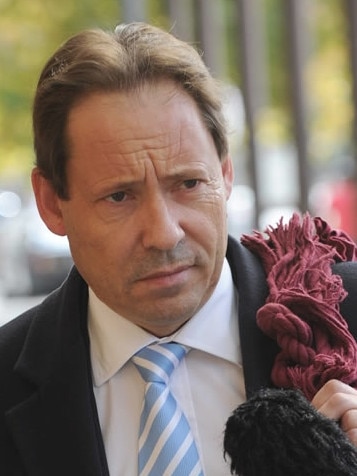
Mr Edwardson was part of Paul Habib Nemer’s defence team when he was prosecuted for shooting newsagent Geoffrey Williams in the eye.
That controversy that saw a Director of Public Prosecutions step down and propelled Labor to another term in government.
Mr Edwardson was openly and publicly critical of politicians using a criminal case as electioneering collateral, and the pollies were equally vocal about his clientele.
Their beef was so bad, Cabinet rejected Mr Edwardson’s bid to become QC in 2006 – it was approved after the intervention of then-Chief Justice John Doyle.
Mr Edwardson has continued to speak out on political issues, including ICAC, in SA but considers two WA cases the most important of his career.
He acted for barrister Lloyd Rayney who was, in 2012, acquitted of killing his estranged wife Corryn.
He also represented Scott Austic who was, after 12 years behind bars, acquitted on appeal of the 2007 stabbing of his pregnant lover, Stacey Thorne.
Both matters had, Mr Edwardson told The Advertiser, “exposed police misconduct”.
CRAIG CALDICOTT
“I believe that it is better nine guilty offenders go free than for one innocent man to be sentenced to jail.”
Graduating from the University of Adelaide and joining the Bar in 1979, Mr Caldicott has worked in every Australian jurisdiction.
Managing partner and senior criminal lawyer at Caldicott + Isaacs Lawyers, he is also co-chair of the Law Society of SA’s criminal law committee.
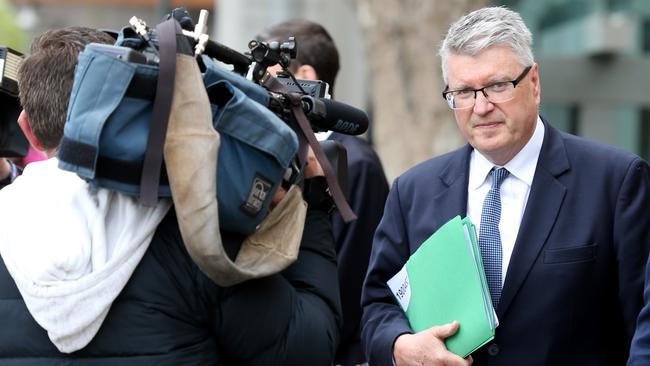
Having acted primarily in the criminal courts, Mr Caldicott is known for helping successfully defend Ivan Polyukhovich in Australia’s only war crimes trial, held before a jury.
“I am a great advocate of the jury system as the alternative would not necessarily function as well,” Mr Caldicott told The Advertiser.
Like others on this list, Mr Caldicott was targeted for scorn by the former Labor Government which, in the early 2000s, unfairly dubbed him a “bikie lawyer”.
It might be thought some of that angst was due to his landmark 2010 High Court win that struck down the government’s anti-bikie laws as “unconstitutional”.
Mr Caldicott counts that case – along with R v Ridgeway, which dealt with police entrapment of suspects – as a milestone moment in his career.
“I believe strongly in the rule of law as it enables the community to protect the vulnerable and persons in need,” he said.
BILL BOUCAUT QC
“All cases deserve the same degree of adherence to the principles of law, and it is the duty of counsel to ensure that their client has their interests represented fearlessly, fairly and in accordance with the law.”
Having earned his law degree in 1974 and been admitted to practice 12 months later, Mr Boucaut has made his way around the country and the world.
He has acted in the criminal courts of SA, Tasmania, the NT and WA, and spent several years prosecuting cases for the Attorney-General’s Chambers in Hong Kong.
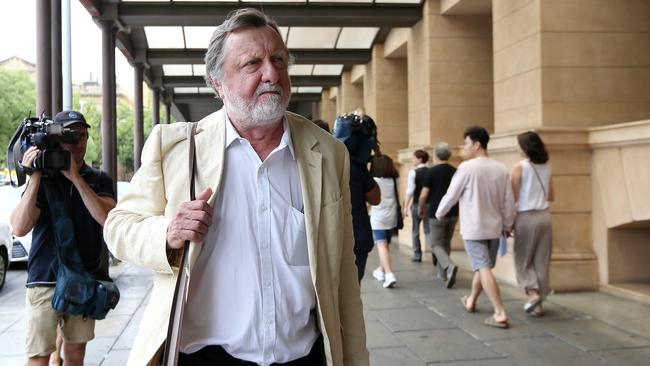
In 1991, upon his return from Hong Kong, Mr Boucaut joined the SA Independent Bar and made an immediate impact on state law – not that he will tell you that.
“No particular case springs to mind as an example and I don’t like talking about my individual cases anyway,” he said in response to The Advertiser’s questions.
Fortunately, the public record chronicles Mr Boucaut’s time in front of juries.
Rather than his clients taking the stand, Mr Boucaut specialises in putting prosecutors “to proof”, digging into their evidence and witnesses in cross-examination, exposing flaws.
He leaves it, then, to jurors to determine whether they are satisfied beyond reasonable doubt.
Mr Boucaut’s clients have included Frankie Marshall, who was acquitted of murder, and dismemberment killer Angelika Gavare, who was not.
More recently, he acted for Salt Creek rapist Roman Heinze and defended ex-nursing student Zainab Abdirahman-Khalif against terrorism allegations.
“To me, the rule of law is an essential aspect of life in a civilised society,” he told The Advertiser.
“Our democracy could not function without it. Laws must be adhered to and interpreted fearlessly by our judiciary with complete impartiality.
“Acknowledging and protecting the fundamental rights of citizens is central to this.”
SANDI MCDONALD SC
“If someone is unfortunate enough to become a victim of crime, they are entitled to the expectation that the prosecutor with conduct of their case will undertake their duties to the best of their ability.”
Graduating from the University of Adelaide in 1992 and beginning her career the following year, Ms McDonald has only ever practised criminal law.
Appointed SC and Deputy Director of Public Prosecutions in 2012, she has crossed swords with almost every other name on this list – and experienced great success along the way.
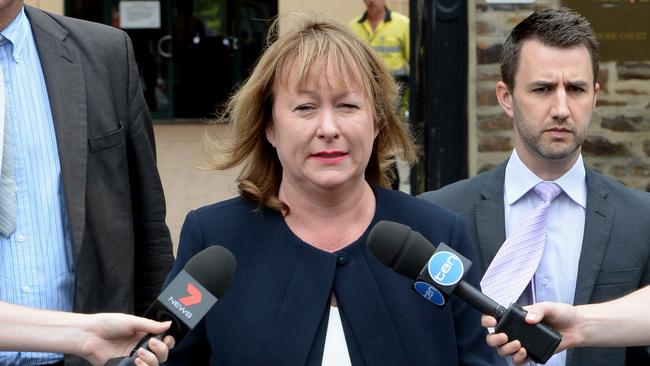
In one of her most memorable courtroom performances, Ms McDonald broke the will of abusive husband Ziollah Abrahimzadeh, who was on trial for murdering his wife Zahra.
After 3½ days of being cross-examined by Ms McDonald, Abrahimzadeh confessed on the stand rather than endure more questioning – a moment not out of place in a Hollywood film.
It is, however, a different case that Ms McDonald – currently prosecuting the NCA bombing murder trial – believes is one of the most important in her career.
She said the 2016 conviction of Dieter Pfennig, over the notorious, long-unsolved 1983 disappearance and murder of Louise Bell, demonstrates “the importance of the law”.
It also shone a spotlight on radical advances in DNA technology, with a one-in-a-billion match from a piece of fluff helping secure Pfennig’s life sentence.
“I was of a similar age to Louise Bell at the time she went missing and I, like many South Australians, grew up wondering what had happened to her,” she told The Advertiser.
“The question of who murdered Louise Bell had haunted SA for almost three decades.
“It was only because of the tireless efforts of those investigating the case that the question was finally answered.”
Ms McDonald said Pfennig’s conviction showed why investigators continued to persist with cold cases.
“Perhaps most importantly, it was this case that has left victims of serious unsolved crimes with hope that despite the passage of time, one day they will too see some form of justice,” she said.
“To have been part of such an important case was an honour and privilege.”
CLAIRE O’CONNOR SC
“Making the unheard heard has been my driver for practice, and I hope that the community realises the need to have we who know the law assist them in getting access to justice.”
In 1980, Claire O’Connor graduated from the University of Otago in New Zealand – two years later, she was admitted as a lawyer in SA.
Between then and 2006, when she went to the independent Bar, Ms O’Connor practised in New Zealand, the UK and in every Australian state except Tasmania.
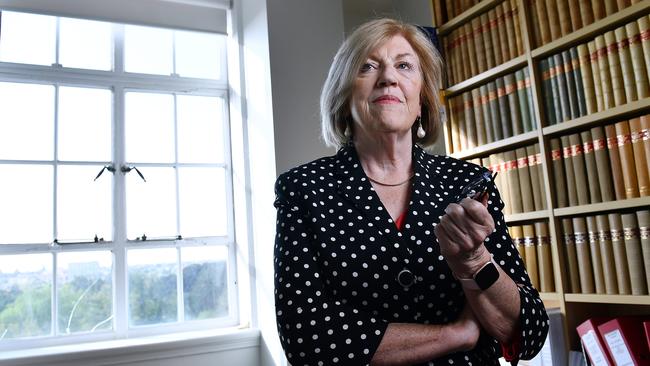
A passionate advocate for human rights and gender equity, Ms O’Connor played a key role in dozens of asylum seeker cases throughout the early 2000s.
She told The Advertiser her experiences in those cases, and especially that of Palestinian national Al Kateb, convinced her Australia “needs a Bill of Rights”.
“(In Al Kateb) the High Court found that you can detain a stateless person for the rest of his life,” she said.
“The decision could only happen in a country without a Bill of Rights and Australia is the only western country without a Bill of Rights.”
Ms O’Connor said she also found her work for Bruce Trevorrow, who sought compensation as part of the Stolen Generation, incredibly important.
“I spent a year working on the case and learned so much about the history of SA and its treatment of Aboriginal persons,” she said.
“That was enlightening, as I did not go to school or study here.”
Ms O’Connor’s advocacy also extends to proper funding for legal entities, especially those that support clients unable to afford representation.
“If people can’t afford lawyers, (governments must) ensure that legal aid and community legal centre bodies are well funded,” she said.
MICHAEL ABBOTT QC
“(Our job) is the task of ensuring that the rule of law is upheld for all of us. This means that the rule of law is the same for all of us, for the worst of us, for the person charged with the greatest crime, the politician, the priest and the prince.”
In December 2011, The Advertiser noted that, a decade earlier, the legal fraternity had expected Michael Abbott QC to “wind down” his career.
Almost a decade on from that article – and 20 years from rumours of his retirement – SA’s most well-known barrister remains a regular sight in and around the courts.
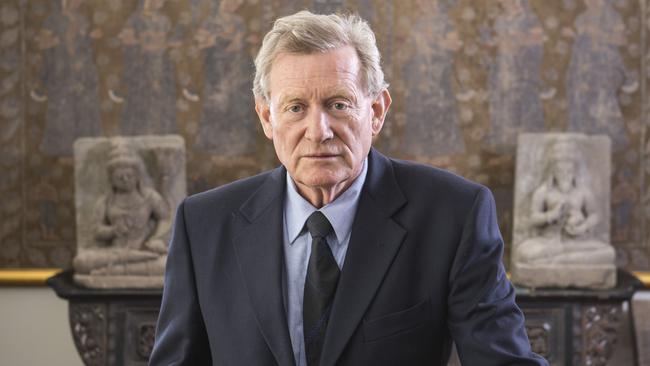
Having graduated from the University of Adelaide in 1964, Mr Abbott’s clientele has spanned from the highest halls of power to the grisliest depths of serial-killing excess.
He has acted for infamous murderers such as Bevan Spencer von Einem and serial killer Robert Joe Wagner.
Mr Abbot has also defended politicians such as former senator Mary Jo Fisher and former mayor Lachlan Clyne, as well as unionists Jim O’Connor and Ark Tribe.
Asked, by The Advertiser, to list the jurisdictions in which he has acted, his reply was a succinct: “Just about all of them.”
That includes work beyond the bounds of the courtroom – he has investigated sex abuse claims on behalf of the Catholic Church and advocated publicly for civil rights matters.
He is famed for his opposition to any extension of the state’s criminal DNA database, which he considers a “significant erosion” of an individual’s right to privacy.
Mr Abbott’s patronage of the arts saw him serve as the Art Gallery of SA’s chairman, while its Southeast Asian Collection is named for him.
Like Mr Caldicott, he considers R v Ridgeway, which challenged police entrapment measures in the High Court, to be his standout case.
That is unsurprising given his ongoing tilt against what some perceive as authoritarian overreach, including his scathing critiques of the state’s ICAC.
GREG GRIFFIN
“It is our responsibility as lawyers to ensure that those without a voice are heard. No matter what the cost to us as lawyers.”
His online bio says he specialises in liquor licensing, corporate law, commercial advice and litigation, and sports law – all of which is something of an understatement.
Perhaps the most visible civil practitioner in SA, Greg Griffin graduated from the University of Adelaide in 1979, took the Bar in 1981, and has run his namesake firm since 1996.
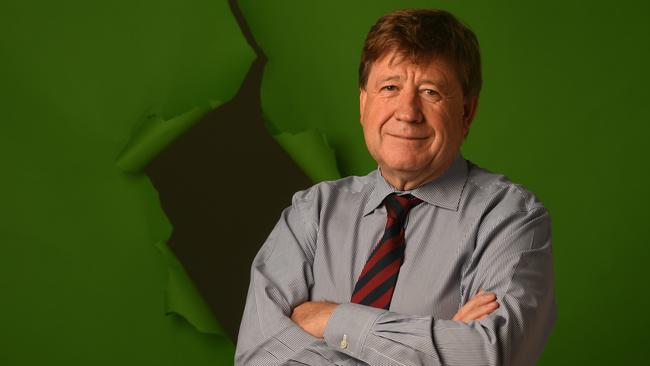
He has practised in SA, NSW and Queensland, as well as England and Wales.
“The rule of law allows us all to live in a civilised society,” he told The Advertiser.
“The entire community, regardless of their financial position or status, have equal rights in the eyes of the law.”
Mr Griffin is also a familiar name to the state’s sporting faithful – he was Adelaide United’s majority owner and chairman until selling his interests in March 2018.
He is the only Australian to have been awarded a Diploma in Football Law by FIFA, the sport’s world governing body.
Asked to name a key case from his career, he chose Acquista Investments v Urban Renewal Authority – better known as the Gillman land deal.
“The SA court found the decision to sell the Gillman land by the government was ‘not amendable to judicial review’ and that the orders sought by Acquista that the Deed of Sale of the land be set aside be refused because it found the decision to enter the contract was of ‘no legal consequence’,” he said.
“The government, after leave to appeal was granted by the High Court, settled the case brought by Acquista before the High Court could hear the appeal.”
MIKE WAIT SC
“My interest in the law comes from a desire to ensure that the Government has the legal tools at its disposal to promote the interests and wellbeing of the South Australian community.”
There are not many legal practitioners who can say they have represented the entire state of South Australia in the nation’s highest court.
But Mike Wait SC has that privilege having battled it out in the High Court as the SA’s Solicitor-General.
Mr Wait by his position is the most senior practising lawyer in the state and appears on the most complicated civil and constitutional litigation.
Mr Wait was awarded a Bachelor of Laws (Hons) from the University of Adelaide in 1998, and a Masters of Laws from Cambridge University in 2002.
In 2001, he served as a judge’s associate to Justice Mary Gaudron, the first woman appointed to the High Court.
In the nearly 20 years since he was admitted to the Bar in 2003 Mr Wait worked in Sydney, Canberra, Vanuatu, London and Adelaide.
A towering figure, taller even that his predecessor-turned-Supreme Court Justice Chris Bleby, Mr Wait sometimes appears to loom over fellow barristers when at the bar.
Mr Wait is in illustrious company as Solicitor-General. Many barristers who fill the role go on to be appointed to the Supreme Court, including Chief Justice Chris Kourakis and former Justice and now Director of Public Prosecution Martin Hinton QC.
“A number of matters I have worked on illustrate the importance of the law,” he said.
“These include the recognition of Aboriginal peoples of South Australia in the State Constitution; the School Chaplains Case about the Commonwealth’s power to spend and state / Commonwealth fiscal relations; defending late-night drinking codes designed to prevent alcohol-related violence; litigation concerning South Australia’s Murray Darling Basin water entitlements; and, the unsuccessful challenge to Western Australia’s Covid-19 border restrictions.”
STEPHEN EY
“The practice of criminal law is so important to me because I derive so much pleasure and satisfaction from representing the individual in cases that appear to be a lost cause but ultimately the presumption of innocence prevails and they are found not guilty.”
Stephen Ey has been an ubiquitous presence around the courts precinct for more than 40 years.
The dulcet-toned solicitor graduated from Adelaide University in 1977 and was admitted to practice the year after.
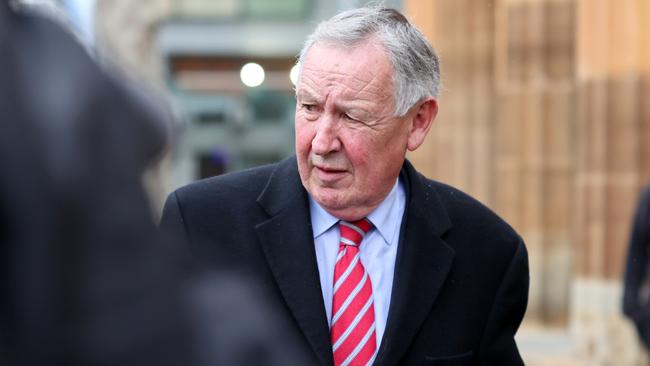
Since then he has practised in all jurisdictions in South Australia as well as interstate.
Mr Ey said the case of Joseph Nashar stood out in his mind along with the recent trial of Jonathon Hawtin, who was acquitted of attempted murder.
Mr Nashar stood trial in the Supreme Court in 1998 charged with the shooting murder of Trevor Carbine, 21, who had burst into the then-46-year-old’s home.
Mr Carbine was shot twice while on the roof of a shed at the property.
Mr Nashar’s legal team, led by Mr Ey, successfully argued their client had been protecting his family and home.
The jury agreed with the argument and acquitted Mr Nashar.
Mr Ey said he took great pleasure in protecting people who appear to be lost causes.
“The presumption of innocence is so important to the community and must be preserved at all costs,” he said.
Mr Ey has been at the helm of his own firm Mangan Ey Associates since 1982, which includes in its staff his son Andrew, also a prominent figure in the legal community.
He said he also derived immense pleasure in mentoring young practitioners and seeing their development.
HARRY PATSOURIS
“Securing a fair and just outcome is important for my clients, and that’s why it’s important to me too.”
When asked what law means and should mean for the community, Harry Patsouris replied simply “fairness”.
Throughout 30 years of practice, Mr Patsouris has followed that dicta to the letter, representing clients from myriad backgrounds on charges ranging from minor to the most serious.
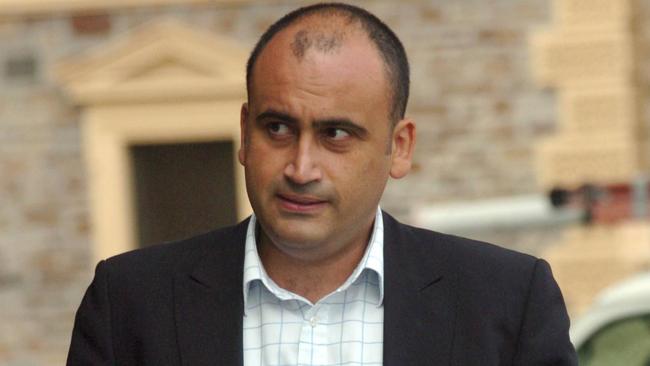
Mr Patsouris graduated from Adelaide University in 1988 and was admitted to the Bar the following year.
In his more than 30 years in practice he has practised in all states and territories but Tasmania.
While known for his law firm Patsouris and Associates, which he started in 1991 shortly after graduating, Mr Patsouris is also a prominent community figure.
He is, among other titles, trustee of the Foundation for Hellenic Studies and Chairman of St Basil’s Homes (SA).
Mr Patsouris is less a figure who appears at the bar himself, but more one who sits in the front row while a carefully instructed barrister, normally a Queen’s Counsel, argues using his submissions.
Mr Patsouris is representing accused in the high-profile Operation Ironside arrests and is an instructing solicitor in the upcoming Jason De Ieso murder trial.
MARIE SHAW QC
“For me, the law means that I have the honour to represent people: to be the voice for those who may not have a voice, for those who need someone to fight for them and for those who are faced with unfair treatment from the State or those acting on its behalf.”
Of all the legal figures on this list, few are as ferocious when at the bar defending a client as Marie Shaw QC.
Decades of legal knowledge, a stint as a District Court Judge and multiple appearances before the High Court have given Mrs Shaw a formidable mien in court.
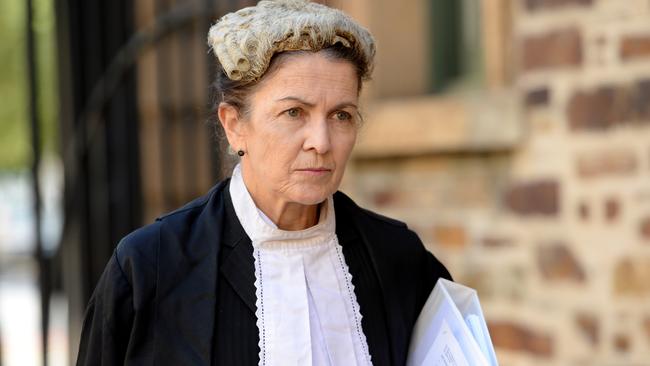
After graduating from University of Adelaide in 1975, Mrs Shaw was admitted to the Bar in 1996.
Since then she has practised in the “High Court, federal court, family court, industrial court, environmental court as well as all state courts”.
Mrs Shaw has been involved in multiple high-profile cases over the decades, and says she focuses on the misuse of power and the consequences of the abuse of that power on the community.
“How often do we hear ‘I never thought this could happen to me?’” she said.
“When it does, the law stands in the way of injustice, loss of freedoms and the misuse of power by the State and other institutions.”
She lists the case of Henry Keogh, who was acquitted of the murder of his fiancee 19 years after being found guilty through incorrect evidence.
“He was another example of members of our community wrongly imprisoned on the basis of flawed scientific evidence.”
Mrs Shaw was also an integral part of the creation of the Ice Factor, a program designed to keep students in school by introducing them to ice hockey.
STACEY CARTER
“The law is forever changing. It is challenging at times, as the law may not always appear necessarily fair. This is because the law’s greatest role is trying to achieve the right balance of protecting the community, upholding the rights of an accused (who is a member of that community), compassionately recognising the rights of a victim and yet maintaining an overall system generally.”
In 1998 one of Stacey Carter’s best friends, Heather Turner, was murdered.
The unsolved death of her dance school friend and the subsequent police investigation helped inspire her pursuit of a career in law.
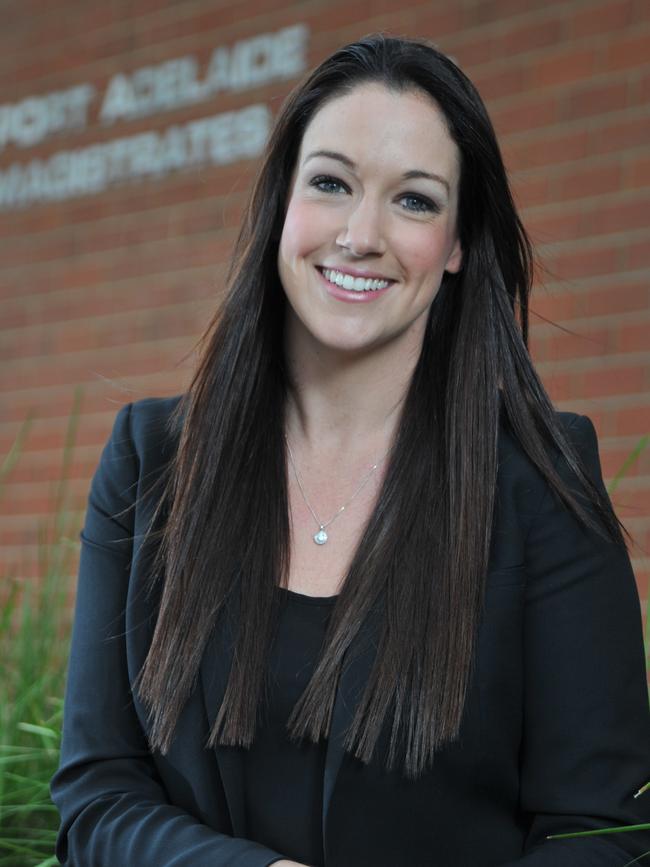
Ms Carter began a double degree in law in 2002, and in 2008 completed her Masters Degree in law, specialising in international criminal law and international relations.
She completed the degree while living and working for the federal government in Canberra, in areas of law including immigration, criminal and national security.
A passionate advocate for helping people, the award-winning lawyer originally expected to become a prosecutor, but later found her passion would be better served as defence counsel where “the stakes are so high for many people”.
She returned to Adelaide in 2009 to work as a defence lawyer and, in 2012, established Port Adelaide firm Carter & Co as a sole practitioner.
Less than 10 years later, Ms Carter now employs 14 “bright, successful women”.
“One of my greatest inspirations has been encouraging other young women to succeed and possess the resilience required for them to work in the legal profession,” she said.
She lists her defence of Hayden Fenton – who was twice charged and later acquitted of the shooting manslaughter of his best friend Bailey Davenport – as a career-defining case.
A jury took just 45 minutes to unanimously find him not guilty.
“It was the greatest tragedy of a group of friends in the woods, where their best friend died,” she said.
She said the “extremely complicated case”, where nobody had seen the fatal shot, would be “a source of inspiration” every time she faced another challenging case.
She has represented former gangland figure Vince Focarelli, and lists multiple other matters including that of former Paralympic athlete Dino Foti, naked and drugged crash driver John Ceruto, and Daniel Bampton, who had murder charges withdrawn following claims of self defence as just some of the cases that have impacted her career.
RACHAEL SHAW AND JOSEPH HENDERSON
“For us, the law provides an opportunity for us to help people who are often at their lowest, who find themselves overwhelmed by the might of the State and the system, and often abandoned by many of their family and friends.”
Small firms rarely make a big splash quickly in the legal sphere, but the duo Rachael Shaw and Joseph Henderson have made their presence known in the state’s highest court only years after joining forces.
The pair represent multiple accused across all levels of the courts.
Ms Shaw, daughter of Marie Shaw QC, studied in the United States and returned to Australia in 2010 to be admitted.
Mr Henderson graduated from the University of Adelaide and was admitted to the Bar in 2011
The pair started their own firm in 2016 and have gone on to defend high-profile clients in the Supreme Court.
The pair said a case that will stick with them was the recent acquittal of an Indigenous man who was found not guilty of murder.
“The knowledge that we forever changed the course of this man’s life and the life of his family, and in such a positive way, is a reminder that whilst the rule of law is the pillar of our democratic society, the law is also about an individual human being,” they said.
“It is that human being which can make the job so fulfilling but also so crushing when the justice system cannot deliver the justice we consider the person deserves.”



